Five new reflections on Europe's migrant crisis
- Published
I'm just back from reporting on the European migration crisis in Berlin. In my last blog I offered some initial impressions from my time there. Here are a few more.
Syrians are a small minority of those seeking refuge in Germany
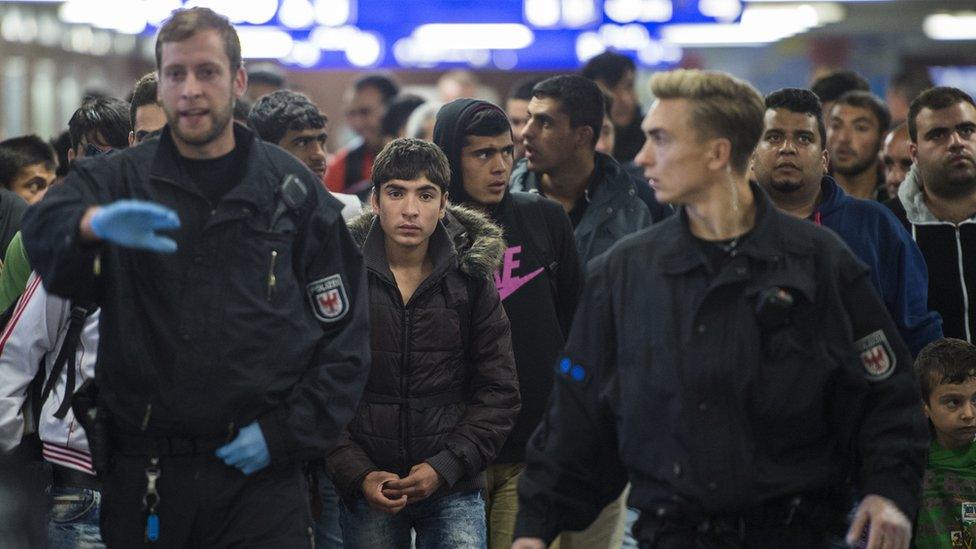
German police officers lead refugees through the Schoenefeld railway station near Berlin
While the tragedy of those fleeing Syria's terrible civil war has caught the popular imagination, such people formed just 20.1% of those seeking asylum in Germany from January to August 2015.
If you add together the Balkan arrivals (from Albania, Kosovo, Serbia, and Macedonia) they amount to twice that, 40.2%. The figures for those granted refuge are quite different because many of the applications from Balkan countries are rejected.
It's hard to avoid the conclusion that tens of thousands of people from relatively peaceful countries have joined the trek to Germany, which is seen as one of the most desirable places in Europe to live.
To put it more bluntly: they are taking advantage of and increasing this crisis. Statistics (attached report in German) compiled by the German authorities, external show that while the number of Syrians went up by 177% during the first nine months of 2015 (compared with the same period last year), the rise from Albania was 631%.
These statistics help to explain both why Chancellor Angela Merkel has faced growing internal dissent about an open door policy (even one that is just intended for Syrians) and tensions with neighbours Hungary, Slovakia, and the Czech Republic.
These countries have been complaining loudly about the strain caused by the numbers of people heading north.
One other point worth noting - the German asylum figures rather undermine Hungarian prime minister Viktor Orban's characterisation of the migration as a Muslim one.
Of course the stats don't give people's faith and Syrian or Albanian refugees are a mix of Christian as well as Muslim. But Syria, Afghanistan and Iraq combined amount to one third of the total, whereas people from either majority Christian or largely secular nations (ie Albania and former Yugoslavia) make up much of the rest.
The flows are already shifting
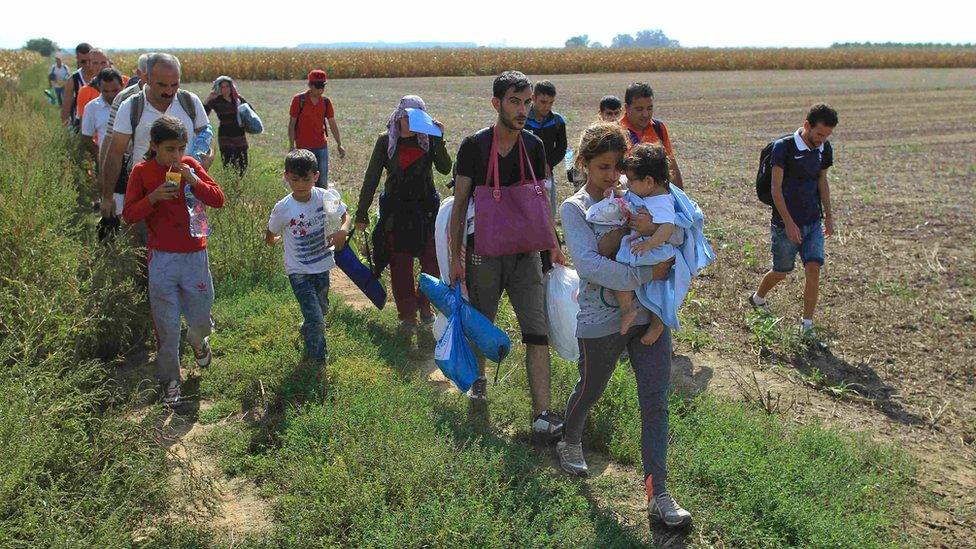
Migrants are crossing into Croatia where they are being registered
While many people have argued that fences "will never work", the early signs are that Mr Orban's policy of sealing the Hungarian-Serbian border is already having the effect he wanted. It channels people to registration areas (from where they can continue to Germany or elsewhere) and dissuades others from trying to cross.
It will be interesting to see whether those trying to circumvent the fence include many from those Balkan and other nationalities with weaker grounds for asylum.
Ugly scenes of people trying to break through the fence, and being tear-gassed by Hungarian police, may play badly with the wider European public - but they won't harm Mr Orban with his right wing base at home.
It may also be that such clashes help him send his intended message to would-be asylum seekers to avoid his country.
There were reports on Wednesday of people making their way from Serbia to both Croatia and Romania in an attempt to avoid Hungary. Both of these EU members have so far avoided having large numbers of migrants.
Bavarian police told me last week about how dynamic in their use of social media and phone the new arrivals were, in terms of seeking the best routes to use. But their ability to bypass Hungary will become limited as other EU countries beef up controls.
It's known that proposals discussed on Monday by European interior ministers, external envisage the construction of more fences, strengthening of the EU border agency Frontex and creation of large assessment camps for those arriving in Italy and Greece, with deportation for those who fail to meet asylum criteria.
The most desperate may avoid Europe
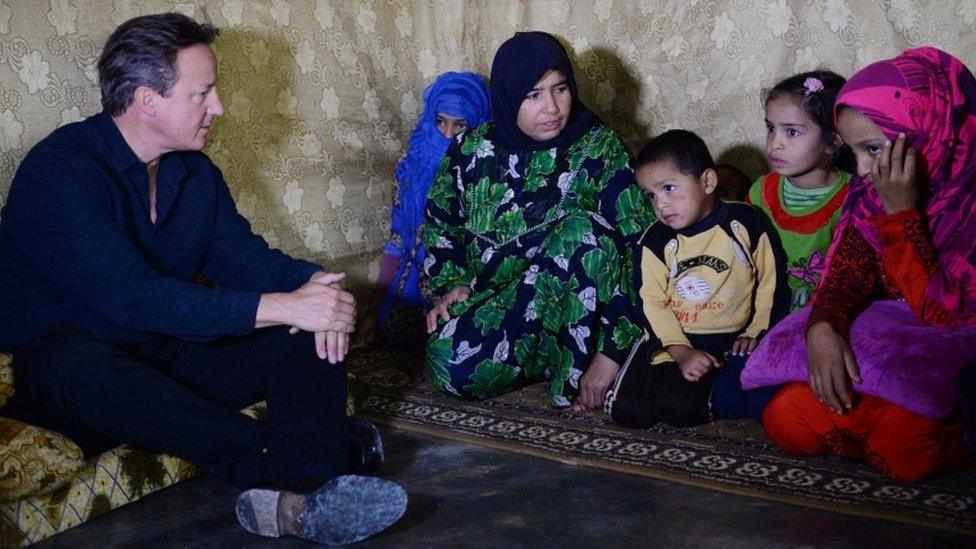
David Cameron heard from refugees during a visit to a camp in Lebanon's Bekaa Valley
One of the most shocking aspects of the Syrian story is the degree to which donor countries have reduced aid to the refugee camps or failed to keep pace with the growing numbers in them.
Food aid for refugee camps in Jordan has therefore been halved recently and many who live in rented accommodation away from camps now no longer get it at all.
David Cameron's trip to Lebanon this week had an important point to make about the UK being the biggest European aid donor to Syrian refugees, even if that is hardly an answer to the question about whether more of them should be settled in Britain.
We know already that the trip to Germany via the Greek islands or Italy is often very expensive. I've spoken to Syrians who've paid £2,000 to make it, but figures of up to £5,000 are not unheard of. That may come from precious savings or relatives elsewhere, but clearly this journey is not open to many.
A farm labourer from Homs, sitting on meagre rations in a Lebanese camp with his wife and four children, is hardly likely to find that sort of money for the six of them.
So what's happening now?
Firstly, thousands of refugees are returning to Syria - aid agencies say the numbers doing that have doubled in recent months. Secondly, people are trying to find cheaper ways to Europe.
Reports this week suggest large numbers of people in Erdine and Istanbul bus stations seeking to travel towards Bulgaria. This is a way of avoiding the costly Mediterranean crossing (and also, potentially, Hungary's fence).
Germany above all
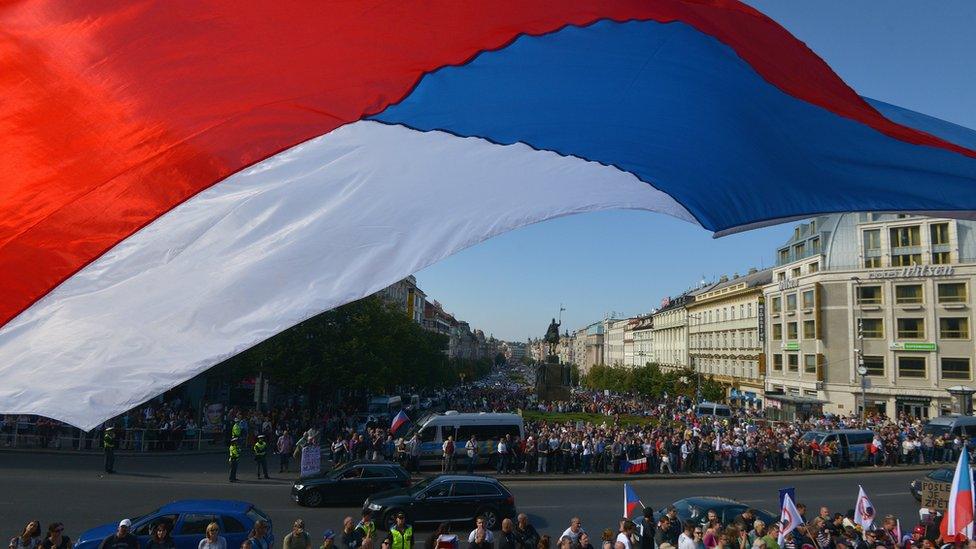
The Czech national flag flies over an anti-migrants demonstration in Prague
From the outset, Germany has sought help by appealing to other European nations to show solidarity, particularly in the matter of receiving more migrants and indeed accepting binding quotas on them.
But over the past fortnight the so-called Visegrad Four bloc (Poland, Hungary, Slovakia and the Czech Republic) has effectively fought back against this idea. While some have tried to argue they can show 'solidarity' through paying more cash (for the type of additional border defences outlined above), these four states are refusing to settle significant numbers of people.
Last week in the Czech Republic I heard the argument many times that very few of those who end up detained in their unpleasant refugee facilities actually want to remain in that country.
If they're aiming for Germany or Sweden, the Czechs or other Visegrad countries ask, why would granting them asylum here have any point, since they would soon head off to where they wanted to go in the first place?
In the end it is the particular desirability of certain countries, notably Germany, that makes it so hard to find quick or indeed more equitable solutions.
Mrs Merkel's nation not only faces long-term demographic issues without migration but is the richest and most desirable destination in Europe. In this, as in the Euro crisis, German leadership is central.
EU principles at stake
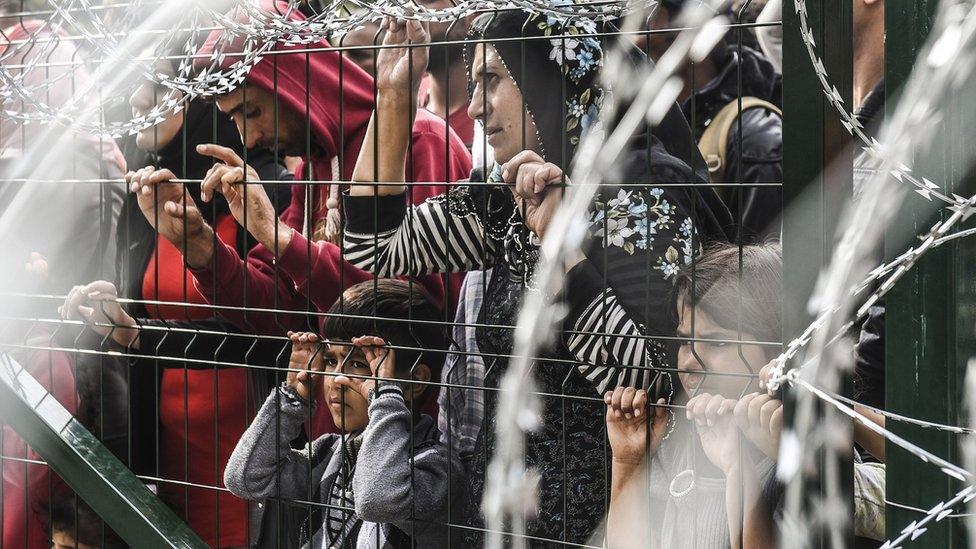
Refugees stand behind a fence at the Hungarian border with Serbia near the town of Horgos
This week's reimposition of border controls has led some to predict the imminent demise of the Schengen system of unrestricted travel. Last week it was the survival of another principle, enshrined in the Dublin Regulations, which stipulates refugees must seek asylum in the first EU country they reach, that seemed to be in doubt.
We don't know yet how either issue will turn out, because temporary controls can be reimposed under Schengen in a crisis and this most clearly is one. The EU's mechanisms are often slow, and in this case have been stymied by members determined to serve national interest while paying lip service to European values.
It would be foolish though to think that, just as fences and camps are springing up, new initiatives will not emerge to handle this. We got a flavour of this in the leaks from Monday's interior ministers' meeting.
The direction of travel now appears to be in the direction of a reassertion of the Dublin Regulations.
This would see large facilities planned in those countries where the largest numbers arrive in the EU, many more deportations of those not granted asylum and the possibility of assessment camps being set up in north Africa too.
Little by little Europe is shutting its back doors.
More tragedies or heartbreaking scenes are likely as this happens, but things will change because too many EU countries have now rejected the option of inaction.
- Published4 September 2015